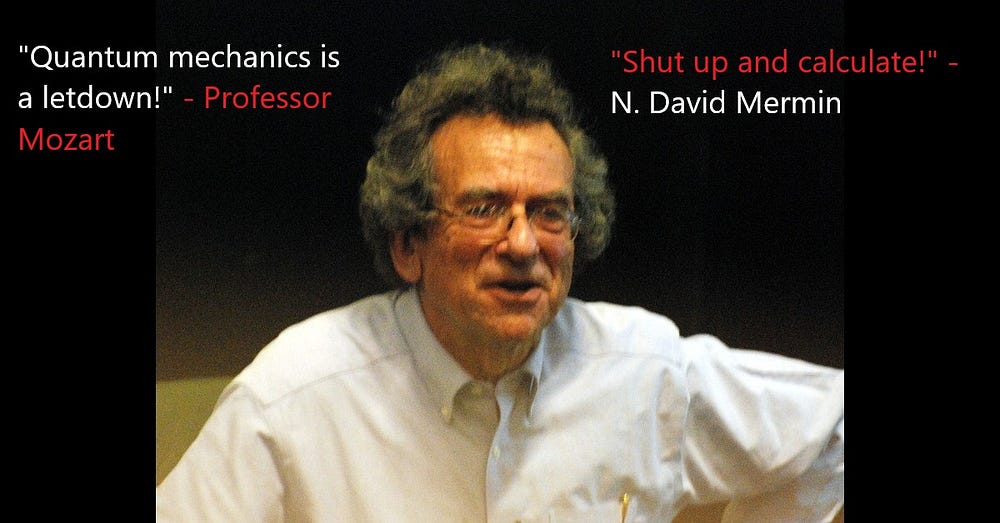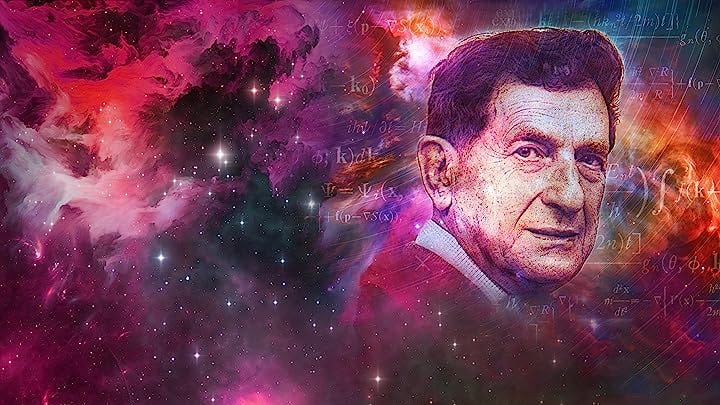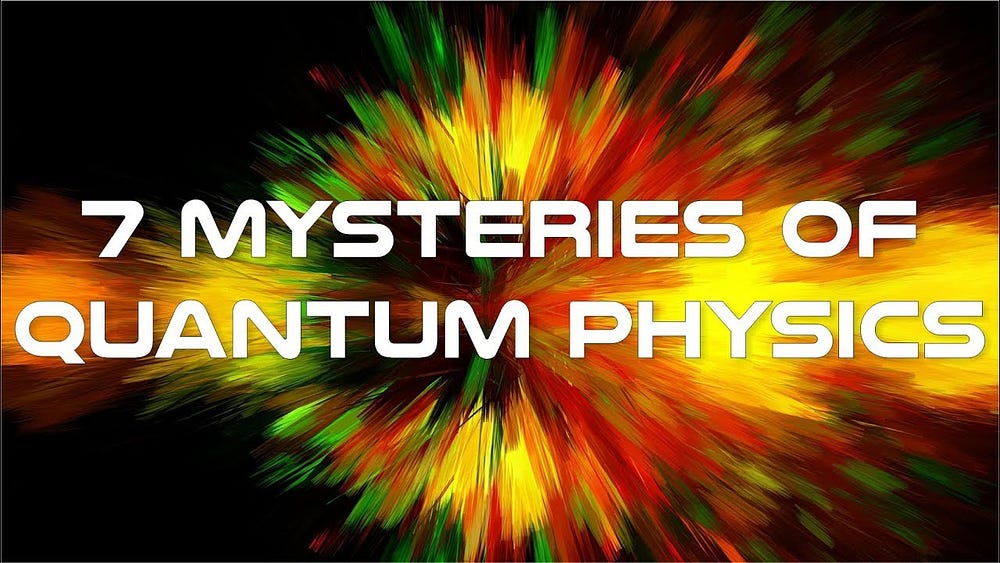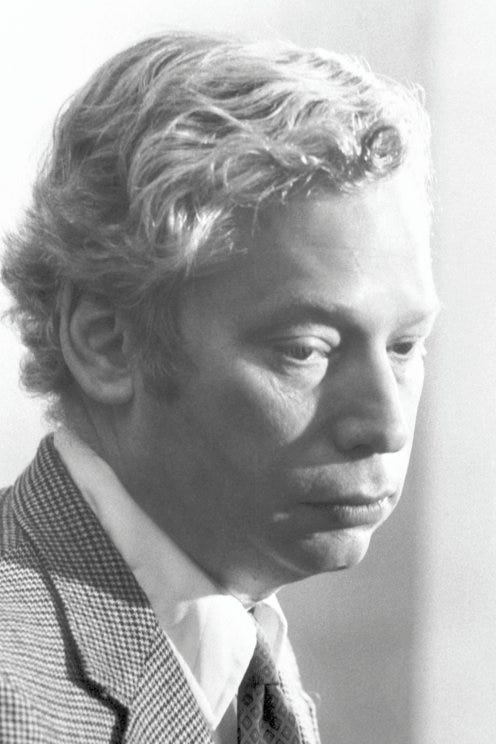The physicist N. David Mermin (of “Shut up and calculate!” fame) created a character called Professor Mozart, who once exclaimed, “Quantum mechanics is a letdown!” He also claimed that “particle physics over the last 40 or 50 years has been a disappointment”. Professor Mozart said these things primarily because he desired something that’s “really profound” from physics… as have certain other physicists.

The following essay makes use of a fictional debate between a real physicist (N. David Mermin), and a fictional physicist (Professor Mozart). This debate can be found in an article called ‘What’s Wrong with those Epochs?’, which was originally published in Physics Today in 1990.
N. David Mermin is (or was) a solid-state physicist at Cornell University. He’s known from his oft-quoted line, “Shut up and calculate!” And Mermin’s slogan neatly ties in with some of the themes of this essay.
[David Mermin wasn’t actually putting his own position with that slogan… Or was he? Check the link just cited.]
Now for Professor Mozart — David Mermin’s own made-up character. He’s “Rachmaninoff Professor of Physical Science somewhere in the depths of central New York”.
Professor Mozart is a dramatic — even exaggerated — character. However, there really are a few physicists — of the deep kind — who think like him.
So it seems that David Mermin picked up on a fixation on (or obsession with) what is “really profound” among physicists. More relevantly, you can bet that no matter what physicists discover, it will never meet that all-too-human and emotional desire for the Profound and the Mysterious.
All that said, this essay takes Professor’s Mozart’s words in a direction which David Mermin himself probably wouldn’t have taken them, and may not even relate to. In other words, Mermin’s Professor Mozart may be read as a physicist who’s simply unhappy with the fact that there’s been no (to use his own words) “really profound” breakthroughs in physics “for over the last 40 or 50 years”. (Professor Mozart’s — or David Mermin’s — words were written in 1990.) This essay, on the other hand, portrays Professor Mozart as thirsting for profundity and mystery. That is, he wants physics to offer him an emotional — and perhaps even spiritual — epiphany. Thus, in my version at the least, Professor Mozart wants physics to go beyond… physics.
Perhaps my own Professor Mozart is similar to the real physicists David Bohm and Paul Davies (among others).
Quantum Mechanics is a Letdown!

David Mermin’s Professor Mozart expresses his deep problem with contemporary physics in the following passage:
“All particle physics has taught us about the central mystery is that quantum mechanics still works. Perfectly, as far as anybody can tell. What a letdown!’”
American-Brazilian-British scientist David Bohm (1917–1992) was mentioned just a moment ago. And Bohm said things which were similar to Professor Mozart’s words.
For example, Bohm categorised Niels Bohr’s position (the Copenhagen interpretation, see here too) on quantum mechanics as being
“a system of formulas that we use to make predictions or to control things technologically”.
However, Bohm exclaimed: “That’s not enough!” He continued:
“I don’t think I would be very interested in science if that were all there was.”
What more did Bohm want?
Perhaps the following words provide one clue:
“The division of art and science is temporary. It didn’t exist in the past, and there’s no reason why it should go on in the future.”
Bohm continued:
“The ability to perceive or think differently is more important than the knowledge gained.”
Professor Mozart also wants more.
So what does he want?
It’s not clear.
However, he does seem to want physics to offer him the Profound and the Mysterious.
So Professor Mozart, just like David Bohm, is really asking physics — or physicists — to do something that isn’t physics at all. More particularly, once you go beyond what works (or the Copenhagen Interpretation) and move to the Profound and the Mysterious (or, in Bohm’s case, to the Artistic), then you’ve simply moved beyond physics…
No wonder Professor Mozart is deeply unhappy with quantum mechanics (as well as particle physics generally).
More to the point. What, exactly, is Professor Mozart referring to when he uses the words “the central mystery”?
Of course, if Professor Mozart — or physicists — knew what the central mystery is, then it wouldn’t actually be a mystery at all. Put differently, if Professor Mozart — or physicists — could say what the Profound and the Mysterious are, then they’d no longer be profound and mysterious.
Perhaps, then, Professor Mozart wants something that cannot be said, only felt. What’s more, perhaps Professor Mozart luxuriates in his cloud of unknowing.
Really Profound?

David Mermin’s Professor Mozart desires something (to use his own words) “really profound” from physics. In full:
“[P]article physics over the last 40 or 50 years has been a disappointment. Who would have have expected that in half a century we wouldn’t learn anything really profound!’
Mermin does actually cite various examples of things which he takes to be really profound. For example, Mermin exclaims:
“Nothing profound!? What about parity conversion? What about the breakdown of time-reversal symmetry?”
Professor Mozart himself doesn’t believe that these examples are truly (or genuinely) profound.
[Mermin didn’t actually need to use Professor Mozart’s hyperbolic word “profound” about his own examples.]
By the words “really profound”, does Professor Mozart simply mean more fundamental, or something that’s more widely applicable throughout the entire universe?
In any case, if we haven’t learned anything really profound “over the last 40 or 50 years” (again, this was written in 1990), then perhaps nothing in physics will ever fit that bill…
Again, all this raises the question as to what Professor Mozart’s words “really profound” really mean, and whether they have any purchase at all when it comes to physics. In other words, if what Professor Mozart, David Bohm, Paul Davies and others want is the Profound and the Mysterious, then perhaps both these things are — by definition — beyond physics. Or, to put that another way, perhaps both these things are (as it were) designed to be beyond physics…
And that’s fair enough.
However, if the Profound and the Mysterious are — by definition — beyond physics, then it’s hardly surprising that physicists (qua physicists) fail to offer deep physicists — and the public — the Profound and the Mysterious.
Physics will always fail to meet these demands.
And, perhaps, that’s the whole point.
Those who yearn for the Profound and the Mysterious may actually want physics to fail in these respects. And that’s primarily because if everyday physicists were to ever offer the Profound and the Mysterious, then any candidates they cared to offer wouldn’t actually be taken to be profound and mysterious by deep physicists.
A Counterblast From Steven Weinberg

Interestingly enough, the theoretical physicist Steven Weinberg (1933–2021) seems to have taken the opposite position to Professor Mozart (as well as to David Bohm, Paul Davies, etc.).
Take Weinberg’s often-quoted and controversial statement that
“[t]he more the universe seems comprehensible, the more it seems pointless”.
[These words can be found in Weinberg’s book The First Three Minutes. As it is, I don’t see the universe as being either “pointless” or “meaningful”. However, that can’t be tackled here. See my ‘Life and the Universe are Neither Meaningless nor Meaningful’. ]
Is it that Professor Mozart and those of his ilk don’t want the universe to be (fully) comprehensible — at least not by physics alone?
In any case, Weinberg explained (in the book Dreams of a Final Theory) his earlier controversial statement in the following way:
“As we have discovered more and more fundamental physical principles, they seem to have less and less to do with us.”
So is it that Professor Mozart, Paul Davies, David Bohm, etc. want physics to have more and more “to do with us”? (This is a question particularly aimed at Paul Davies.)
Again, Steven Weinberg seems to be arguing that physics — even theoretical physics — should do the job of making things less profound and mysterious, not more so.
Weinberg also said the following:
“As long as we don’t know the fundamental rules, we can hope that we’ll find something like a concern for human beings, say, or some guiding divine plan built into the fundamental rules.”
However:
“[W]hen we find out that the fundamental rules of quantum mechanics and some symmetry principles are very impersonal and cold, then it’ll have a very demystifying effect.”
The English physicist and writer Paul Davies has been mentioned a couple of times in this essay. Steven Weinberg himself mentions him in respect to Davies receiving a million-dollar prize for “advancing public understanding of God and spirituality” from the John Templeton Foundation. (See my ‘Physicist Paul Davies’s Contributions to the Advancement of Religion, As Seen By Father Mariano Artigas Weinberg’.)
Weinberg said:
“I was thinking of cabling [Paul] Davies and saying, ‘Do you know of any organization that is willing to offer a million-dollar prize for work showing that there is no divine plan?’”
Conclusion: Philosophy?
The above isn’t a philistine or anti-philosophical position on contemporary physics and quantum mechanics. (I can’t speak about David Mermin’s own attitude toward philosophy.) After all, a philosophical position can be advanced (along with arguments, etc.) as to why we can’t really have more than the fact that quantum mechanics (well) works — “perfectly”. (See my ‘Let’s Eliminate All the Interpretations of Quantum Mechanics’.) The philosophy comes in when it’s argued that perhaps all the interpretations of quantum mechanics, as well as all the talk of the Profound and the Mysterious, are philosophically problematic in that physics itself will never satisfy the human desire for that which cannot be said, only felt.
My flickr account and Twitter account.












No comments:
Post a Comment